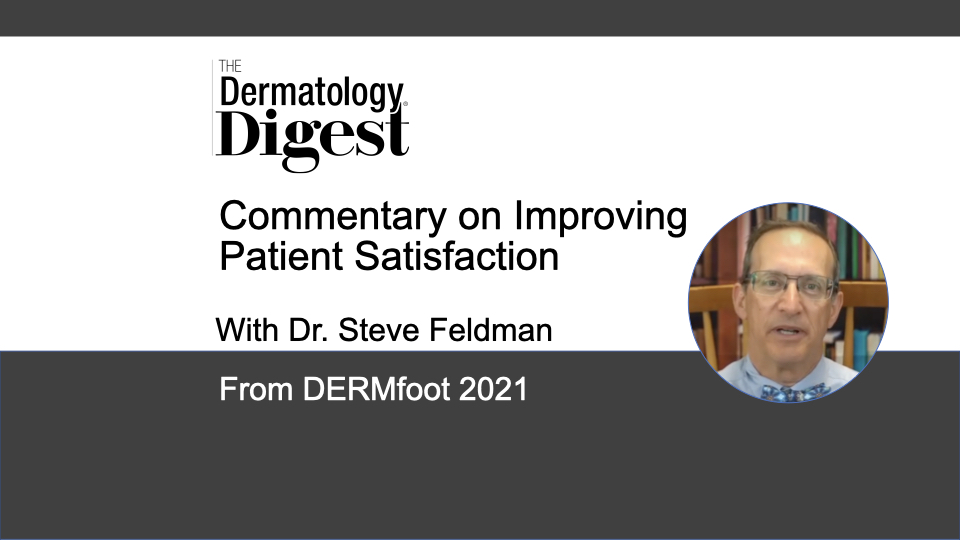Dr. Steve Feldman discusses the concept of care beyond diagnosis and treatment in the pursuit of patient satisfaction.
Steve Feldman, MD, PhD, is Professor of Dermatology at Wake Forest University School of Medicine in the Department of Dermatology Pathology and Social Sciences and Health Policy, Winston-Salem, NC.
“There’s only one element that has a meaningful effect on patient satisfaction. And that’s whether the patient thinks you care about them or not,” says Steve Feldman, MD, PhD, Professor of Dermatology at Wake Forest University School of Medicine, Winston-Salem, NC.
Dr. Feldman presented, “Improving Patient Satisfaction,” at the DERMfoot 2021 Virtual Seminar in April, in which he covered how satisfied patients tend to be with their doctors, the most critical elements of patients satisfaction, and how to respond to online criticism.
Overall, he says, even with the right diagnosis and treatment, patient satisfaction comes down to their perception of whether a doctor cares.
“How long you keep people waiting has almost no impact on patient satisfaction. How much time you spend with them has almost no impact. There’s a one-to-one relationship between whether they think you care about them, and their satisfaction with you,” says Dr. Feldman.
That means doing and saying the things that make patients feel like they are a priority, including showing and telling them they are important and taking the time to examine their issue even if you can diagnose it at a glance.
In other words, he emphasizes, “care” is not simply communicated as the correct diagnosis and treatment.
“…if you make the right diagnosis and prescribe the right therapy, but they… don’t trust the medicine that you prescribed and they don’t take it, you will not succeed in your job of getting people well. So this is an essential part of medical care no matter how you look at it.”
If and when you are faced with criticism and/or poor patient ratings, Dr. Feldman’s advice is to increase your number of positive ratings.
“What you want to do is ask every patient to give you feedback online. If you do that then you get a representative sample. [Then] if anybody does give you a low score, two things happen. Number one, it gets totally diluted by the many more high scores you get. And number two, it makes your overall rating look believable.”
Furthermore, online criticism isn’t always a bad thing.
“It can tell you that maybe your staff is being surly to people over the phone when they make the appointment, or maybe your waiting room is dirty …or your parking situation needs to be improved or you personally aren’t giving patients the details in writing or in enough detail that they’re remembering. Or it could be any of a host of things that will make you better if you take it seriously and address it.”
When responding to online criticism, Dr. Feldman cautions to carefully avoid acknowledging it is your patient because of the potential for HIPAA violation.
“So the best thing to do is to address the criticisms… and say something like, ‘I really want to be of help. Please contact the office, and we will do our best to meet your needs.’ You want to say something that does not in any way imply that you actually have seen the patient previously. You want to say something that just exudes how much you care about them and about patients in general. And then you look like the good guy, and if they come back and with more, when anybody looks at it, you come off looking really good.”


